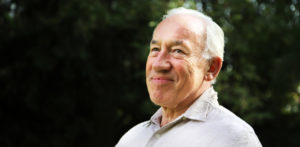
Opera in the Time of COVID: Simon Callow, An Award-Winning Writer, Director, & Actor
By David Salazar(Credit; Frances Marshall)
“Opera in the Time of COVID” is an interview series in collaboration with photographer Frances Marshall of Marshall Light Studio. We talk to notable figures from around the opera world to get their perspective on how they feel these challenging times may change opera’s present and future.
Simon Callow has likely found his way into your life in one of several ways. For me personally, it was via his epic Orson Welles biography, more specifically, “Volume 1: The Road of Xanadu (as this interview will unveil, he’s still working on the fourth volume of that extensive work).” He also recently wrote a fantastic biography on Wagner, which we spoke to him about a few years back.
But others may know Callow as an actor. His film credits include, but are not limited to, “Four Weddings and a Funeral (for which he received a BAFTA Nomination for Best Supporting Actor), “A Room With a View (another BAFTA-nominated performance),” “Shakespeare in Love,” “The Phantom of the Opera,” “Amadeus (he plays Emanuel Shikaneder, the librettist for “Die Zaubderflöte),” “Maurice,” and “Notting Hill;” IMDB lists 134 credits as an actor and that doesn’t even take into account work in the theater as both an actor and director. Among the operas he has directed are “Così fan tutte,” “The Consul,” “Il Trittico,” and “Die Fledermaus.”
So in this edition of Opera in the Time of COVID, Callow talks about his views of the situation, how it will (or shouldn’t) affect the world of opera, and the concerns he has for the future after this comes to pass.
OperaWire: What have you done during this time to keep yourself positive and productive?
Simon Callow: Writing, mostly. I’ve made a start in the 4th volume of my biography of Orson Welles, and am writing a couple of reviews, revising a play I wrote a while ago, blah blah.
OW: What do you feel will be the greatest impacts of COVID-19 on the opera world moving forward?
SC: To be candid, there should be no reason why COVID-19 should have any impact on the world of opera. I imagine that when it’s all over, everyone will attempt to go back to what we had. The big difference will be that many companies, smaller ones, to be specific, will have gone to the wall.
It takes years – decades, sometimes – to build up a company, to cultivate loyal audiences, to start being braver with the repertory, discover new artists etc. Pray for people with the vision and the patience to enable that to happen.
OW: One of the major developments of this time are the emergence of streaming and connecting with fans and followers more directly via social media. How has this impacted your time in quarantine?
SC: I’ve seen a number of movies that I might not otherwise have done. The Berlin Philharmonic’s streaming has been most elegantly done, and includes an opera (“Suor Angelica”).
OW: What do you enjoy most about this new development?
SC: Clearly it’s great that people who for one reason or another – expense, or physical difficulties – can’t make it to the opera house get to see productions they’d otherwise miss. But the live event is the thing we need to focus on. Getting more operas out there to more people, less expensively, must still be the goal.
OW: What are you most excited about doing once the quarantine officially comes to an end and we are allowed to resume a “normal” life?
SC: Going to Greece, to Italy , to France, to Germany. Oh, and going on stage again. I was rehearsing a new musical on Broadway – featuring Britney Spears ’s back catalogue – when the great axe fell and they bundled me into the next plane back. From where I’m sitting at the moment, I don’t see much chance of my getting anywhere near a stage until Christmas at the earliest.
OW: Who have been the people you have relied on most to help you through these challenging times?
SC: My husband, really – this has tested our relationship to the hilt and it’s come through with flying colors.
OW: What activities do you miss the most?
SC: Dining, taking tea with chums, going to concerts – and the opera, especially the opera. I’m the occasional critic of the New Statesman and I am feeling pretty intense withdrawal symptoms
OW: Most people in quarantine are actively engaging with the arts via either music, TV, film, reading, literature. Etc. What have you been watching or reading during this time?
SC: Nothing more than I would do normally, really. I’m reading a lot but it’s mostly to do with my writing. A book I dip into constantly is by the great pianist Stephen Hough. It’s called “Rough Ideas,” and is a source of unending stimulation , like being involved in an ongoing conversation with a very dear friend who happens to be both a superb musician and a master of precise, witty language
OW: Speaking more globally about the pandemic, what can the world learn about this experience? What do hope to see from our leaders (political or even industry) in order to build a better future that enables us to better manage any similar type of situation?
SC: I’m afraid I’m rather skeptical about the capacity of politicians or captains of industry to think widely or deeply, so I wouldn’t expect any major changes. The most we can hope for is a vaccine and a better understanding of the virus and pandemics in general. On the whole, I hope that the glum absence of art – whether in galleries or on stages – will remind people of how extraordinary and necessary a part of our lives it is
Categories
Interviews

